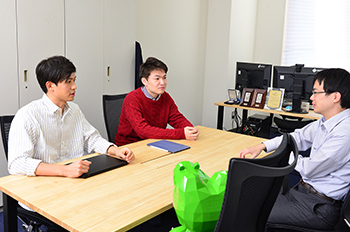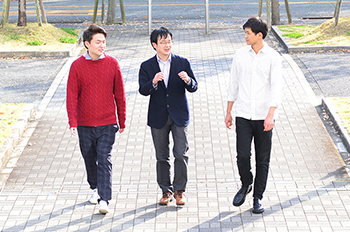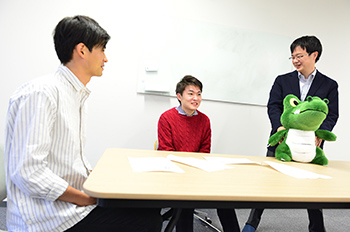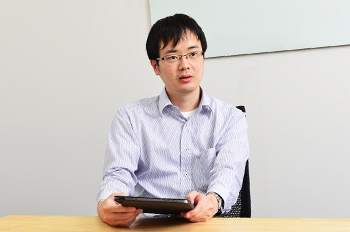Intelligent Integrated Systems,
Information Systems Engineering
Associate Professor
Shiomi Jun
You have just moved from Kyoto University to The University of Osaka's Graduate School of Information Science and Technology. What do you think are the differences between Kyoto University and The University of Osaka?
My impression before I moved here was that it was an amazing group of people who were involved in many famous research projects. Although famous, the research is carried out quietly and with no advertisement - that's what kind of university I thought it was.
In terms of research, I had the image that a lot of software and application research was being done. I had been doing hardware-based research, such as low-power integrated circuit design and security. Therefore, I decided to enter the Graduate School of Information Sciences, thinking that I would be able to create a new interdisciplinary research perspective if I went to such a place.
I think that many of the students in the Graduate School are honest and serious. They understand the intentions of the faculty and work accordingly. I feel that many of them understand what the faculty members want to say and work on their own based on that.

When you are working on a single research project, you may get stuck or have no clue how to solve the problem. How do you deal with that?
When no amount of thinking helps, I forget about it for a while. Then, when I read a paper on a completely different project, I may happen to find a solution to the problem that I had put away, and think "Oh!" If I find it, I can incorporate it directly into my research, so I often leave it to chance.
I'm not sure I can give good advice, but I think it would be good to put up antennas in various places and think where else things can be used while doing something completely different - to look at things from an interdisciplinary perspective.
I love thinking about one problem all the time by myself, but I tend to be biased in my questioning, and it's hard to come up with new solutions. I sometimes encounter new things when I listen to people in different fields, even while wondering what the point of all that is. I think that is good for research.
I think it is important to make new encounters by yourself. Recently, I bought pork bones, a noodle-making machine, and a pot by mail order, and made ramen from scratch. This is a project where I cook my own soup, make my own noodles, and make my own ramen at home. I've done it three times so far, and it's interesting because you can make it even at home. It's a lot of work, but you can make the noodles and soup in three to four hours. It is hard work to knead and make noodles by yourself, but as you work mindlessly, you may make new discoveries.


Students often worry about what to do after they get their PhD.
When did you start thinking about staying in academia?
I had a vague idea of becoming a doctor from the time I entered university, but I only had the vision of getting a doctorate. I did research as my interest led me, and before I knew it, I was doing my current job.
If you stay in academia after graduation, however, you will have students with you, and you will be involved in supervising them and managing the university. I felt that I would have to spend more time thinking about things other than myself, and that I would have less time for myself.
I graduated early, but after I graduated, I thought back on the precious time I had to do nothing but research. I think it is very good to spend three years in freedom while thinking a lot.









